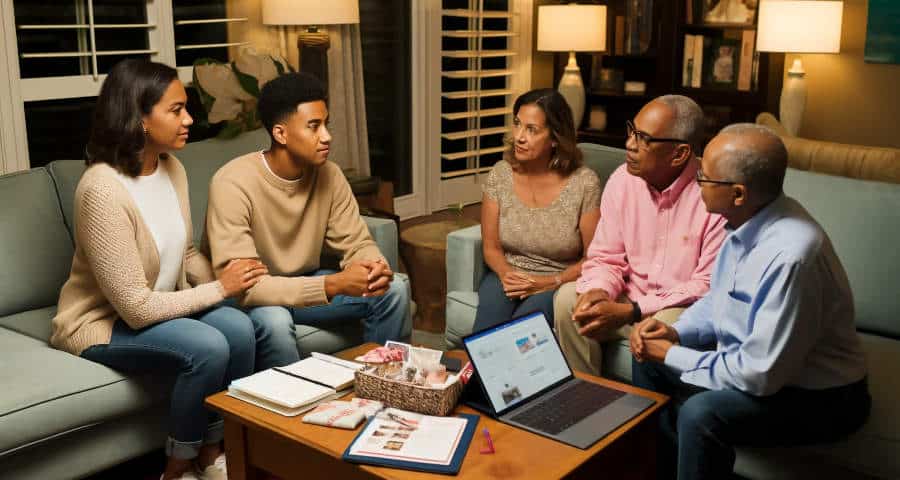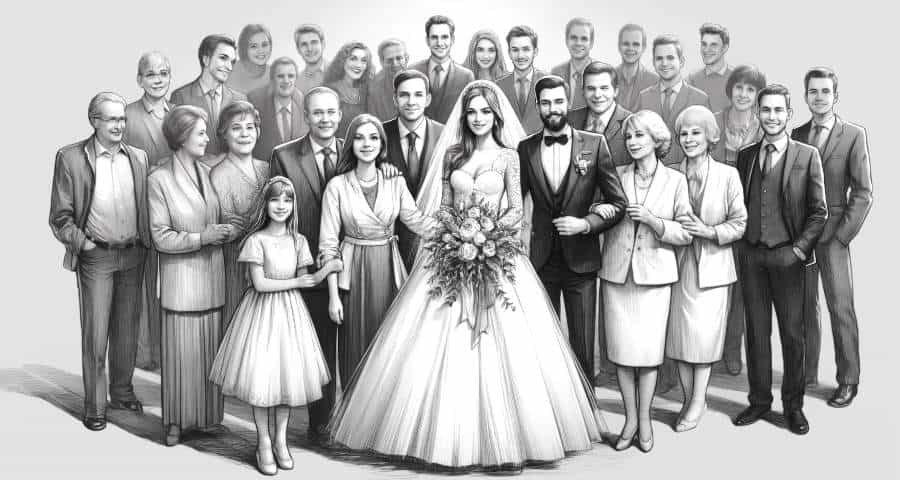Historically, the bride’s family was responsible for the lion’s share of the wedding costs, covering everything from the reception venue, catering, and decorations, to entertainment and the bride’s attire.
Today, the financial dynamics of weddings have shifted significantly. Many couples now emphasize making their wedding day uniquely theirs, which extends to financial planning.
As a result, there’s no strict rule for who pays for what wedding expenses. The approach to financing a wedding varies greatly among couples, influenced by personal choices and circumstances.
Who traditionally pays for what in a wedding?

In Western cultures, the division of wedding expenses is often influenced by traditional roles assigned based from the relationship of each party to the bride or groom.
Here is a breakdown of who traditionally pays for what when it comes to wedding attire.
Attire
| Bride’s dress | Bride’s Family |
| Bride’s accessories | Bride’s Family |
| Groom’s attire | Groom’s Family |
| Groom’s accessories | Groom’s Family |
| Bridesmaids’ attire | Bridesmaids or Bride’s Family |
| Groomsmen’s attire | Groomsmen or Groom’s Family |
| Flower girl’s attire | Bride’s Family or Flower Girl’s Family (varies) |
| Ring bearer’s attire | Bride’s Family or Ring Bearer’s Family (varies) |
Ceremony
| Wedding ceremony venue | Bride’s Family |
| Marriage licence and officiant fees | Groom’s Family |
| Ceremony decorations and altar arrangements | Bride’s Family |
Reception
| Reception venue | Bride’s Family |
| Catering and food | Bride’s Family |
| Wedding cake | Bride’s Family |
| Bar and beverages | Bride’s Family |
| Reception decorations | Bride’s Family |
| Tables, chairs, linens, and tableware | Bride’s Family |
Flowers & Decorations
| Floral arrangements | Bride’s Family |
| Bouquets and boutonnieres | Bride’s Family |
| Ceremony decorations | Bride’s Family |
| Reception decorations | Bride’s Family |
| Aisle decorations | Bride’s Family |
| Altar arrangements | Bride’s Family |
| Centrepieces | Bride’s Family |
| Flower girl’s accessories | Bride’s Family or Flower Girl’s Family (varies) |
| Ring bearer’s accessories | Bride’s Family or Ring Bearer’s Family (varies) |
Beauty
| Bride’s hair and makeup | Bride’s Family |
| Groom’s grooming | Groom’s Family |
| Bridal party’s hair and makeup | Bridal Party |
Stationery
| Wedding invitations | Bride’s Family |
| Save-the-date cards | Bride’s Family |
| Programs | Bride’s Family |
| Place cards and menus | Bride’s Family |
| Thank-you cards | Bride’s Family |
Photography & Videography
| Wedding photographer | Bride’s Family |
| Videographer | Bride’s Family |
| Engagement photo session | Typically covered by the couple, often included in the photographer’s package |
Transportation
| Transportation for the bridal party | Typically covered by the couple or Bride’s Family |
| Limousine or special transportation for the couple | Typically covered by the couple or Groom’s Family |
Entertainment
| DJ or live band for the reception | Bride’s Family |
| Ceremony musicians or singers | Bride’s Family |
| Photo booth or other entertainment options | Typically covered by the couple |
Wedding Rings
| Wedding bands for the bride and groom | Typically covered by the couple |
Gifts & Favours
| Wedding favours for guests | Typically covered by the couple |
| Gifts for the bridal party | Typically covered by the couple |
| Gifts for parents and special attendees | Typically covered by the couple |
Honeymoon
| Honeymoon expense | Typically covered by the couple |
Wedding Planner/Coordinator
| Fees for hiring a wedding planner or coordinator | Typically covered by the couple |
Who is Contributing to Your Wedding?

In today’s diverse social landscape, understanding the sources of your wedding funds is more important than ever.
By engaging in open and honest conversations with your partner and family members, you can navigate this aspect of wedding planning with grace, respect, and understanding.
But, who is actually financially contributing to your wedding?
The answer can vary greatly from couple to couple, but here are some common sources of wedding funds:
- yourselves: Many modern couples choose to pay for their own weddings, either partially or entirely. This approach allows for greater autonomy and control over the wedding planning process, but it also requires careful budgeting and financial planning.
- Parents of the Bride and Groom: Traditionally, the bride’s family was expected to cover most of the wedding expenses, but this custom has evolved. Today, it’s common for both sets of parents to contribute to the wedding, often splitting the costs evenly or based on their individual financial situations.
- Grandparents and Extended Family: Grandparents and other extended family members may offer to contribute to the wedding as a gift to the couple. These contributions can be monetary or cover specific aspects of the wedding, such as the wedding dress, flowers, or music.
- Friends: While less common, some friends may offer to contribute financially, especially if they play a significant role in the wedding, such as being part of the bridal party. Others might offer services as gifts, such as photography, catering, or entertainment, which can reduce overall expenses.
- Fundraising and Crowdfunding: A newer and increasingly popular option is crowdfunding, where couples set up a fund that friends and family can contribute to instead of traditional gifts. This can help cover specific costs like the honeymoon or a special project at the wedding.
Ultimately, the decision of who contributes to your wedding is a personal one that should reflect your values, financial situation, and relationships with your loved ones.
By having open and honest conversations, setting clear boundaries, and expressing gratitude for any contributions, you can navigate this aspect of wedding planning while maintaining strong relationships with your family and friends.
To learn how to determine your overall budget and align it with your priorities read our article on Setting Your Wedding Budget to learn how
For practical tips on how to manage your wedding expenses effectively, continue reading Planning a Wedding on a Budget, which provides strategies for setting a realistic budget and ideas for maximising your funds without compromising the beauty and significance of your special day.
Factors Influencing Who Is Financially Supporting the Wedding

The decision on who financially supports a wedding involves a complex interplay of cultural norms, personal values, financial stability, and more.
By understanding these factors, couples can better plan their wedding financing, ensuring that all contributions are managed respectfully and effectively.
Open communication and clear agreements are essential in aligning expectations and creating a memorable celebration that honours everyone involved.
Cultural and Familial Expectations: Cultural norms and familial expectations play a significant role in determining how wedding expenses are divided. In many cultures, the bride’s family traditionally bears the cost of the wedding. However, in modern times and especially in more Western cultures, it’s becoming common for both families to contribute or for the couple to finance their wedding independently. Understanding these cultural expectations can help manage family dynamics during wedding planning.
Financial Stability: The financial stability of the couple and their families greatly influences who can contribute to the wedding. Couples who are established in their careers and financially stable may choose to pay for their wedding themselves to maintain control over the planning process. On the other hand, younger couples or those still building their careers might rely more on their parents or family members for support. It’s important for couples to have honest conversations about their financial situations and expectations to avoid misunderstandings or strain on relationships.
Personal Values: Personal values concerning independence, financial responsibility, and family roles often shape decisions about wedding financing. Some couples may value the tradition of their families contributing, while others might prioritise the autonomy that comes with self-funding their wedding. Couples should discuss their values and priorities openly to ensure they’re on the same page and can communicate effectively with their families.
Maintaining Control Over Your Wedding: When your family offers substantial financial support for your wedding, it’s natural for them to have specific expectations or a particular vision for the event. This support may sometimes lead to a sense of entitlement.
However, it’s crucial to remember that your wedding day should ultimately reflect your love story and the unique vision you and your partner share for this special occasion. While financial support is appreciated, striking a balance between honouring the wishes of those who contribute and ensuring your wedding remains a genuine celebration of your love is essential.
Consider taking care of some expenses yourselves. By doing so, you gain more control over the decisions and choices that matter most to you. This approach can lead to a calmer and more enjoyable wedding planning process, even if it means scaling back certain aspects of the celebration.
Remember, your wedding is a reflection of your relationship, and finding the right balance of financial responsibility can help you create a day that truly captures your love and shared dreams.
Age and Life Stage: Age and life stage are closely tied to financial capacity and willingness to spend on a wedding. Couples who marry later in life are often in a better position to fund their own weddings due to more time spent in the workforce. Conversely, younger couples might be more dependent on family contributions. It’s essential to consider how age and life stage might impact expectations and abilities to contribute financially.
Previous Marriages: For those entering a second marriage, financial responsibilities may be approached differently. Often, individuals who have had a wedding before may choose to have a simpler ceremony or may have different expectations about family contributions. They may also have additional financial obligations, such as children from previous relationships, that impact their ability to contribute to the wedding.
Economic Climate: The broader economic climate can impact wedding budgets significantly. During economic downturns, families may have less disposable income to contribute towards a wedding, which might lead the couple to adjust their expectations and wedding plans accordingly. Couples should be mindful of the current economic situation and how it might affect their wedding budget and the ability of others to contribute.
Wedding Size and Style: The scale and style of the wedding can also dictate financial contributions. A large, formal wedding with many guests is likely to require substantial funding, possibly from multiple sources. In contrast, a smaller or more informal wedding might be easier for the couple to finance on their own. Couples should consider how their wedding vision aligns with their budget and the potential contributions from others.
Couples should consider how their wedding vision aligns with their budget and the potential contributions from others. To understand how to allocate your budget across different aspects of your wedding, read our article on Wedding Cost Breakdown: Allocating Your Budget.
Setting Clear Boundaries and Expectations

When accepting financial contributions for your wedding, it is crucial to set clear boundaries and expectations upfront.
This proactive approach ensures that all parties involved understand their roles and limits, preventing potential conflicts and misunderstandings that could strain relationships.
Why Set Boundaries?
Financial contributions often come with expectations, sometimes unspoken, about what the contributors get in return, such as input on the guest list, choice of venue, or aspects of the ceremony and reception. Without clear boundaries, these expectations can lead to disagreements that overshadow the joyous nature of the occasion.
How to Set Expectations
- Discuss Contributions Openly: When a family member or friend offers to contribute financially, have a candid discussion about what this contribution entails. Specify if their contribution will influence certain decisions and to what extent.
- Express Your Vision: Clearly communicate your wedding vision to your contributors. Understanding that you have specific ideas may help them see where they fit in the planning process without overstepping.
- Create a Written Agreement: Though it may seem formal, having a written agreement or a clear list of what each party is contributing to can help clarify expectations. This document should outline not just the financial contribution but also the scope of decision-making power that comes with it.
- Be Grateful but Firm: Always express gratitude for the generosity of contributors, but don’t shy away from being firm about your preferences and boundaries. It’s important they understand that while their contribution is appreciated, the final decisions rest with you and your partner.
Handling Disagreements
If disagreements arise, refer back to the discussions and agreements you had at the beginning of the planning process. Remind all parties involved of the previously set boundaries and the shared goal of making your wedding day a reflection of your love and partnership.
Benefits of Clear Boundaries
- Reduced Stress: Knowing that everyone understands and agrees to their roles can significantly reduce planning stress.
- Stronger Relationships: Clear boundaries prevent bruised feelings and damaged relationships, ensuring that the wedding enhances your relationships rather than strains them.
- A More Enjoyable Wedding Experience: With everyone on the same page, you can focus more on the joy of your wedding day and less on managing expectations.
By setting clear boundaries and expectations, you not only safeguard the financial aspects of your wedding planning but also protect your personal relationships and ensure that your special day remains focused on celebrating your union.
Honouring the Contributions to Your Wedding

Understanding that these contributions come from a place of love and generosity is crucial. Expressing heartfelt gratitude not only acknowledges this generosity but also deepens the connections with those who support you.
A Heartfelt Thank You: Start with the basics, a sincere thank you. Whenever someone commits to supporting your wedding, whether financially or through other means, take the time to express your gratitude personally and promptly. A personal call, a handwritten note, or even a thoughtful email can make your contributors feel truly appreciated and valued.
Involve Them Meaningfully: For those who express a desire to be more involved in the wedding planning, find ways to incorporate their strengths and interests. This inclusion can make the wedding experience more enjoyable and memorable for them and can alleviate some of your planning burdens. For instance, if someone has a knack for decor, involve them in choosing the wedding theme or decorations.
Public Acknowledgment: During your wedding reception, make it a point to publicly thank those who have contributed. This could be done during speeches or toasts. Publicly acknowledging their support not only shows your appreciation but also lets your guests know about the wonderful support system that helped bring your special day to life.
Personalised Tokens of Appreciation: Consider giving personalised tokens of appreciation to your key contributors. These can be custom-made gifts, such as engraved items, or thoughtful mementos that reflect your gratitude. Personalised gifts show that you have put thought and effort into thanking them, which can mean a lot.
Keep Them Updated: As your wedding plans progress, keep your contributors informed and engaged. Share important updates, milestones, or even small, memorable moments. This ongoing communication helps them feel involved and connected to both the process and your journey towards marriage.
Celebrate Their Support Beyond the Wedding: Expressing gratitude should not end at the wedding. Continue to acknowledge the love and support of your friends and family even after the event. Celebrating these relationships and their contributions in your life’s journey reinforces the bonds you have and builds a foundation for future support and happiness.

